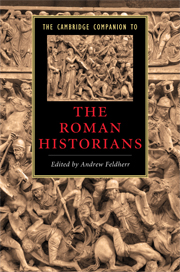Book contents
- Frontmatter
- Introduction
- Part I Approaches
- Part II Contexts and Traditions
- Part III Subjects
- Part IV Modes
- Part V Characters
- Part IV Transformations
- 20 Josephus
- 21 The Roman exempla tradition in imperial Greek historiography: The case of Camillus
- 22 Ammianus Marcellinus: Tacitus’ heir and Gibbon’s guide
- 23 Ancient Roman historians and early modern political theory
- 24 Re-writing history for the early modern stage: Racine’s Roman tragedies
- 25 The Roman historians and twentieth-century approaches to Roman history
- Chronological list of the historians of Rome
- Bibliography
- Index
25 - The Roman historians and twentieth-century approaches to Roman history
from Part IV - Transformations
Published online by Cambridge University Press: 28 November 2010
- Frontmatter
- Introduction
- Part I Approaches
- Part II Contexts and Traditions
- Part III Subjects
- Part IV Modes
- Part V Characters
- Part IV Transformations
- 20 Josephus
- 21 The Roman exempla tradition in imperial Greek historiography: The case of Camillus
- 22 Ammianus Marcellinus: Tacitus’ heir and Gibbon’s guide
- 23 Ancient Roman historians and early modern political theory
- 24 Re-writing history for the early modern stage: Racine’s Roman tragedies
- 25 The Roman historians and twentieth-century approaches to Roman history
- Chronological list of the historians of Rome
- Bibliography
- Index
Summary
“Why do scholars not contemplate the possibility that we perceive historical truth differently from the ancients?” (Woodman 1988: 202) / In his Rhetoric in Classical Historiography, A. J. Woodman challenged notions of the nature of the “historical” texts of classical antiquity, and specifically their relationship with “historical truth” as understood by “modern historians.” His focus on rhetoric evokes Hayden White's highly influential (and, in more traditional quarters, controversial) treatments of historical writing as kinds of discourse, its pretensions to truth and objectivity no more and no less than the “rhetorical strategies” of the genre. Indeed, Woodman has issues even with White: the latter persists in imagining “stable events” to be told by his “alternative rhetorical strategies,” implying that there is ultimately some historical “truth” and fixity after all (1988: 197-9; White 1973, 1985, 1987). Woodman's “modern historians” are potentially a large and broad group that includes historians of modern societies, but his detailed arguments are with named modern historians of antiquity and the claims they have made about the status of ancient “historical” writing. His polemic is directed against two Professors of Ancient History, Peter Brunt and Kenneth Dover, for their claims that Cicero and Thucydides respectively propound methodologies remarkably similar to those of modern scientific history, and Ronald Syme for his preference for the critical gaze of Tacitus as a marker of truth-telling (1988: 197-205).
- Type
- Chapter
- Information
- The Cambridge Companion to the Roman Historians , pp. 394 - 406Publisher: Cambridge University PressPrint publication year: 2009
- 5
- Cited by

